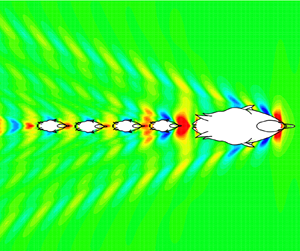Most read
This page lists the top ten most read articles for this journal based on the number of full text views and downloads recorded on Cambridge Core over the last 90 days. This list is updated on a daily basis.
Contents
Onsager's ‘ideal turbulence’ theory
-
- Published online by Cambridge University Press:
- 27 May 2024, P1
-
- Article
-
- You have access
- Open access
- HTML
- Export citation
Experimental and numerical investigation of turbulent spots in a flat plate boundary layer
-
- Published online by Cambridge University Press:
- 02 April 2025, A37
-
- Article
-
- You have access
- Open access
- HTML
- Export citation
Spectral proper orthogonal decomposition and its relationship to dynamic mode decomposition and resolvent analysis
-
- Published online by Cambridge University Press:
- 29 May 2018, pp. 821-867
-
- Article
-
- You have access
- HTML
- Export citation
Defining the mean turbulent boundary layer thickness based on streamwise velocity skewness
-
- Published online by Cambridge University Press:
- 15 October 2025, A19
-
- Article
-
- You have access
- Open access
- HTML
- Export citation
Variable-property and intrinsic compressibility corrections for turbulence models using near-wall scaling theories
-
- Published online by Cambridge University Press:
- 15 September 2025, A8
-
- Article
-
- You have access
- Open access
- HTML
- Export citation
Small-scale properties from exascale computations of turbulence on a
 $\mathbf{32\,768^3}$ periodic cube
$\mathbf{32\,768^3}$ periodic cube
-
- Published online by Cambridge University Press:
- 18 September 2025, R2
-
- Article
-
- You have access
- Open access
- HTML
- Export citation
Direct numerical simulation of turbulent channel flow up to
 $\mathit{Re}_{{\it\tau}}\approx 5200$
$\mathit{Re}_{{\it\tau}}\approx 5200$
-
- Published online by Cambridge University Press:
- 10 June 2015, pp. 395-415
-
- Article
-
- You have access
- HTML
- Export citation
Water entry of cups and disks
-
- Published online by Cambridge University Press:
- 16 May 2023, A14
-
- Article
-
- You have access
- Open access
- HTML
- Export citation
Wave-riding and wave-passing by ducklings in formation swimming
-
- Published online by Cambridge University Press:
- 05 October 2021, R2
-
- Article
-
- You have access
- Open access
- HTML
- Export citation
Drop rebound at low Weber number
-
- Published online by Cambridge University Press:
- 18 September 2025, A25
-
- Article
-
- You have access
- Open access
- HTML
- Export citation

































